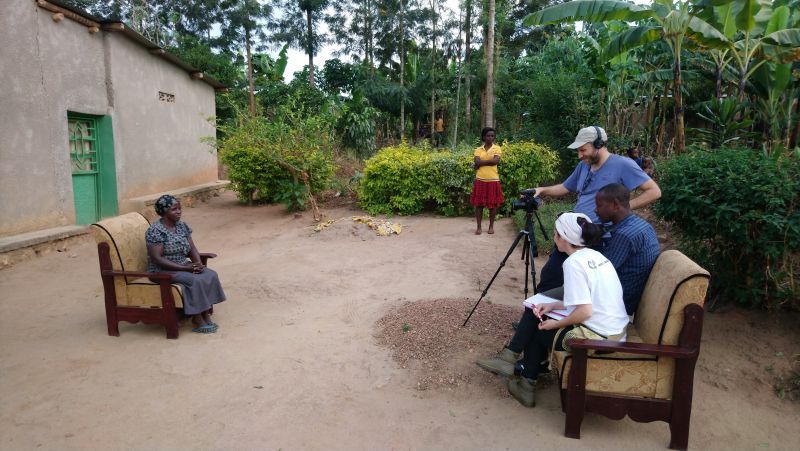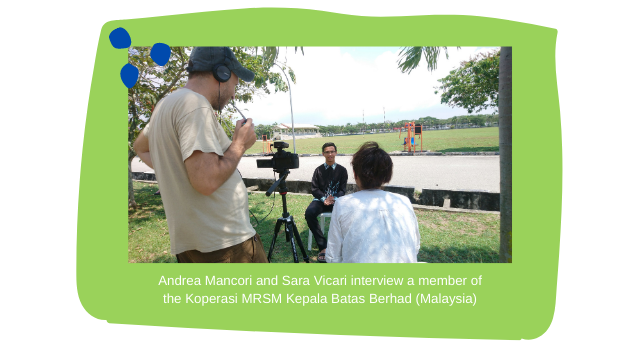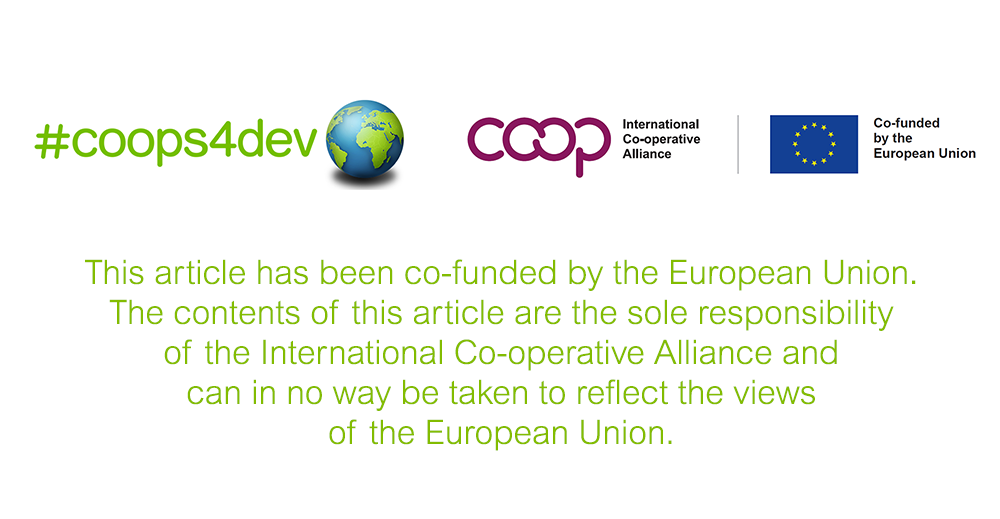
The aroundtheworld.coop worldwide trip has arrived to its last stop (Poland) and now all documentary films of the series are out [you can watch them here].
We talk with the filmmakers of the documentary film series aroundtheworld.coop, Sara Vicari and Andrea Mancori, about the filming approach, their experience with cooperators across the globe and the key elements that make this collection of cooperative stories an exciting and educative journey to discover the power of change through collective action.
Aroundtheworld.coop has documented a total of 13 cooperative stories from different corners of the world and a diversity of sectors. What all these cooperatives have in common is a capacity to drive social, economic, and environmental sustainability through innovation and the full engagement of their members.
Your working process stems from your own backgrounds in the audiovisual sector (Andrea) and in the research field (Sara). How have these different backgrounds helped in the development of the project?
Sara: This methodology [built from both professional experiences] is the added value of this project. It goes beyond the approach of a researcher or a filmmaker going into the field, we can say it is innovative from both sides. As a researcher, I am committed to contributing to the academic discussion and to documenting good practices. It is important for all researchers to spread knowledge and let it circulate. But the format of a written scientific article generally prevents it from circulating beyond the academic community. What we want to do with the videos is to reach a wider audience and communicate in a different way. We also want to communicate the emotional aspect. For instance, one could read about motivation, but when she sees the eyes of the people involved in collective action by watching them in a film, her level of engagement can be different, and so can her level of understanding.
Andrea: From the audiovisual perspective, it was a challenge to go into the field without a script. In previous projects, I used to prepare a script together with my team before going into the field. We decided with Sara to take the fantastic challenge to go without it.
S: When you produce a documentary starting from the script, the messages that you will convey are decided in advance. In our project, we wanted the message to come from the cooperators. I think this is another important added value of combining research and filmmaking: the content is entirely decided upon by the people.

How was the process of building the script from scratch with the participation of the cooperators?
A: We carried out our first fieldwork in Castel Volturno (Italy) in the summer of 2018. After spending a few days with them, listening to their stories, Sara and I agreed that it was not possible to work with a script if our aim was to spread innovative stories of positive impact via the voices of cooperators. Our aim would have not been consistent with a pre-defined script. And so that is how we decided to spend more days with the people there, to learn from them about their story and their experiences, and then convert it into an edited video.
S: This is why our work takes a lot of time. We start with a focus group discussion, in which cooperators come with their views and insights. And then, together we create a kind of a mind map that shows their story with a storytelling approach. We believe that this is the moment of connection. From this moment, the flip chart is our script.
Indeed, these flip charts can be seen in the video on your methodology which is on your website. By watching this video, I was thinking how valuable it must be for the cooperators to have an external person telling their story and probably offering new perspectives as well as reasons to praise what they are doing.
S: By the end we could see this as a kind of an unintended outcome of our project. The feedback received from the people involved made us understand that we were doing something more than just a participatory video. That activity itself [the participatory action research activities] had an impact on the cooperators. It happened in Rwanda, in Morocco, in Nepal… People were saying: “we do a lot of things and we are not appreciating them” or “I was not aware about these stories behind other members”. From my previous experience in the cooperative movement, I had the feeling that cooperators do a lot, but they do not usually take a moment to step back and evaluate themselves. This is why we have now decided, alongside the aroundtheworld.coop team, to provide a service of facilitating the self-assessment and the internal communication in coops.

It’s not easy to approach people and make them feel comfortable in front of the camera. What are your tricks?
A: The most important thing is building trusting relationships with people. Respect them. Make them feel comfortable and let them take ownership over what they are doing. We usually spend a couple of weeks in the cooperative before filming, we become friends and this friendship is respected. Sometimes, in the interview they become emotional in front of the camera, sometimes they cry. When it happens, we turn the camera off because we don’t want to be sensationalist. That’s not our aim at all.
S: Again I think that the methodology makes all the difference. We spend time with them, we eat together, we drink, we live together for days. We want to create a relationship with them. At the end, the result is that people are opening their hearts because they are trusting us, and they understand that what they are saying is good for themselves and their coop.

From a cinema perspective, did you have any reference in mind (e.g., any filmmaker, short or long film, or series of films)?
A: Before starting the journey, I watched Sense8 and I thought about this series during the trip. The plot talks about eight human beings who are connected mentally and physically, and share knowledge, skills, and languages. During the trip, I realised that in some way the cooperators that I met worldwide were similar to the characters of Sense8 and they are connected through the same values and principles.

Based on your experience by visiting a diverse range of cooperatives from different sectors and regions, is it possible to identify common challenges among them? If so, what are these challenges?
S: When we talk about common challenges, I think that there is one aspect which is both the added value and the main challenge for cooperatives: working together. Keeping a horizontal leadership and ensuring that everyone shares a common vision, inspired by the same values, is not easy. A cooperator in California [from the Cheese Board Collective] once told us: “it is unbelievable how one person with a destructive energy can ruin the whole project”. He highlighted how important it is for cooperatives to select people appropriately and develop different systems, such as governance systems, or capacity building, to cope with these challenges. On the other hand, when this aspect of democracy works smoothly, it is one of the true added value of coops. But to make it work effectively is a huge challenge.
What pushes people to start/join a cooperative? Did most of the members know what a cooperative is before joining it?
S: The initial steps in all of the stories we documented come from a wish of change within a group, not necessarily that they wanted to create a cooperative. In my opinion, one of the elements of the success is the shared motivation: people come together because they want to make a change and they want to do it together. The other element is that they aim to create something sustainable, something durable.
Then, the enabling environment (the networks, apex organisations, contacts, other coops…) allows those genuine initial first steps to become a valuable collective cooperative enterprise. Both components are interrelated. It is very difficult for a genuine movement to continue without support or a structure, and, on the other side, you cannot create a coop if you do not have a group that proactively comes together with a clear vision and mission.

You have been visiting and listening to a great number of cooperators across the globe. What are the main lessons you have learnt during this trip?
S: There are many lessons we could highlight. We would like to focus on two aspects: innovation and leadership. This trip reaffirmed our thinking that innovation happens on the ground and is driven by communities. Communities know the challenges they are facing, and they envision ways to overcome these challenges. When these initiatives take the form of a cooperative enterprise, they often result in a sustainable and innovative endeavor that deserves to be shared with the world in order to inspire other communities. The majority of the stories we documented have this power! Regarding the second aspect, these stories could not happen without visionary and resilient people who take the lead and transform ideas into a sustainable enterprise. These are special people, capable to lead but at the same time capable of developing a horizontal leadership, in which everyone feels welcome to participate and have a say. We noted that this aspect makes the difference for a truly transformational cooperative project!

In a prior interview with #coops4dev you mentioned that you wanted to contribute to invert the gloomy narrative in the media by talking about the constructive and successful collective initiatives that are taking place around the globe and remain unknown to the majority of the citizens. In the unusual current context of global health and economic crisis, do you think that these stories are now needed more than ever?
S: For sure. Cooperatives and collective action initiatives in general have a great role to play in contributing to sustainable development. Our project has shown many examples in this regard. They are a powerful means to work simultaneously towards achieving the three dimensions of sustainability, namely social, economic, and environmental. The pandemic has brought to everyone’s attention that cooperation and defense of the common good is needed now more than ever. The alternative to the mainstream should be shared with wider society. And certainly, we want to continue contributing to this effort.

This trip might have brought you many moving moments, yet is there, in particular, an image (i.e., one of those mental snapshots that remain in your mind during years after an important trip) that you are taking with you from this travel?
S: This is difficult to say, as there are many. But probably we will not forget an incredible interview in Australia. We were in the furthest place from home, and we had just listened to the most incredible and suffering story that a human being could cope with. In the dignity of this member, we saw all the members we had met in our journey.

-----
The ICA-EU Partnership on international development (also known as #coops4dev) was signed in 2016 between the International Cooperative Alliance and the European Commission to strengthen the cooperative movement as a key actor in international development.
Read more about #coops4dev on our website.





